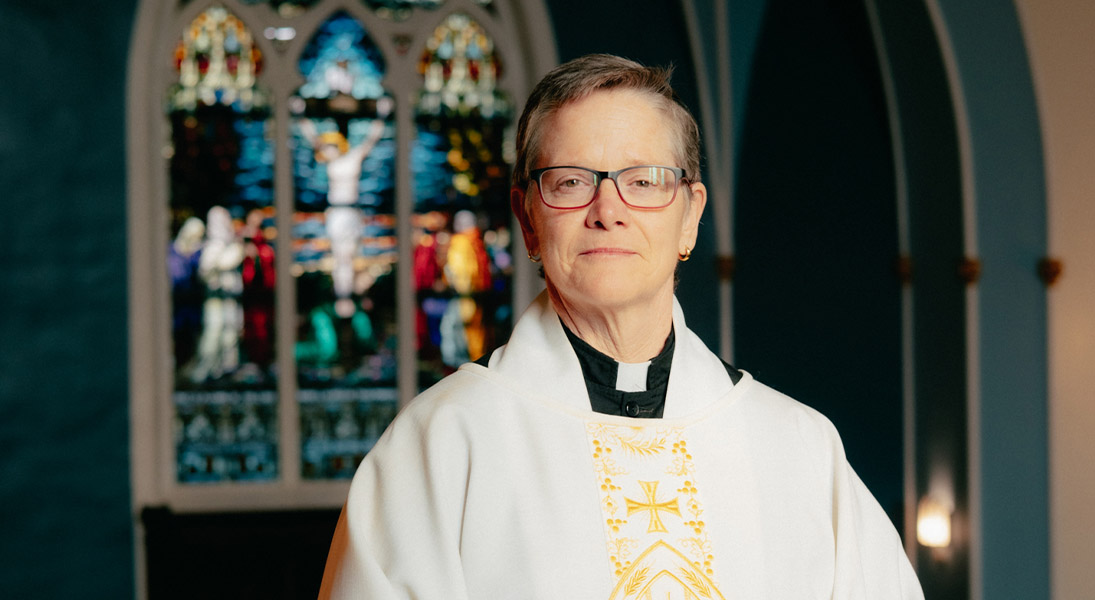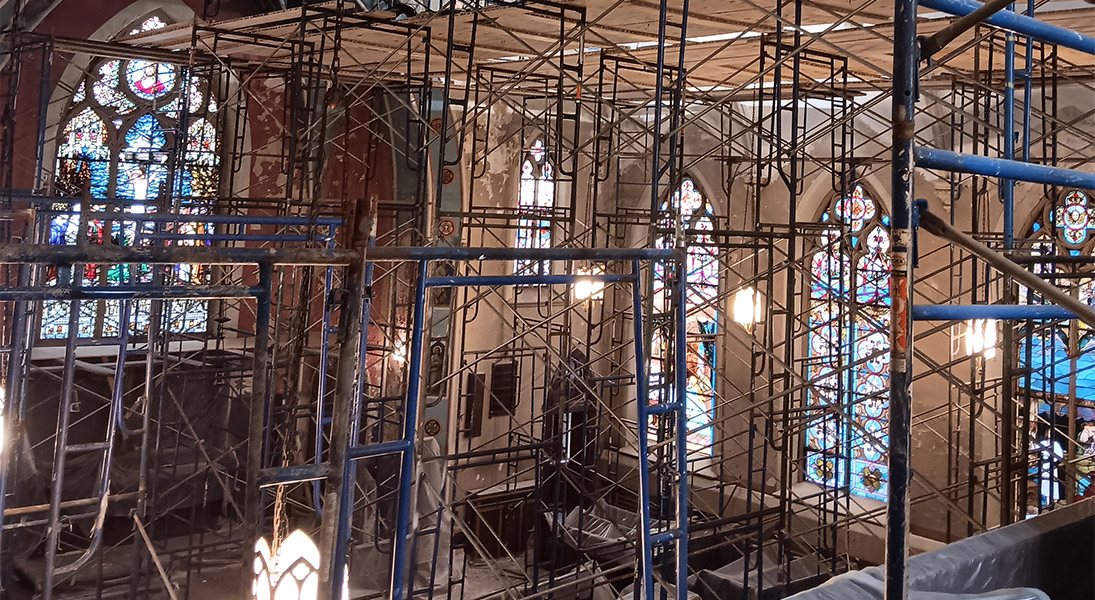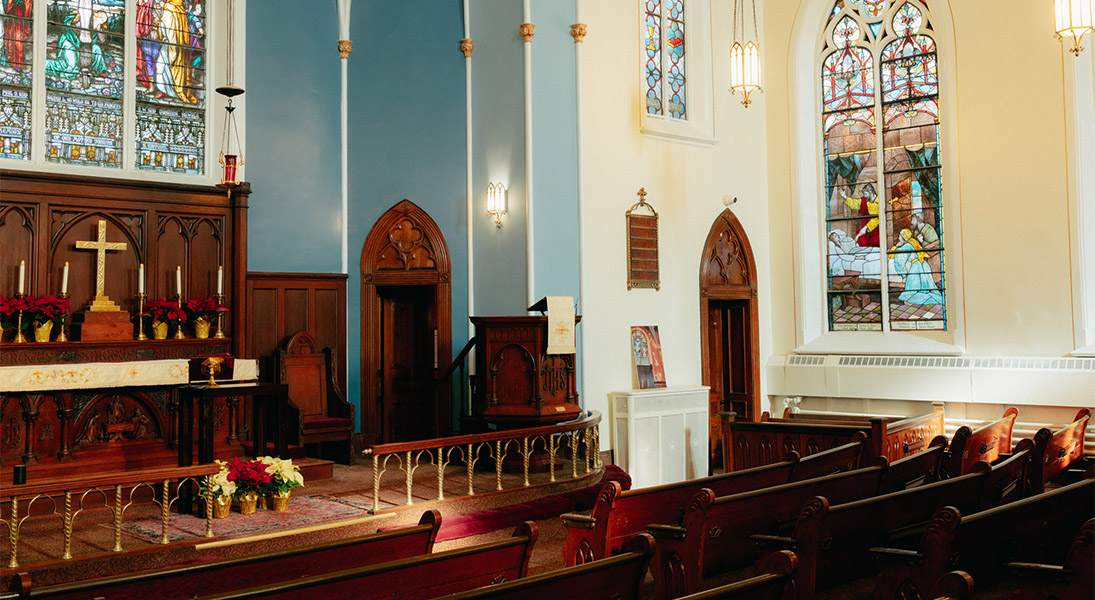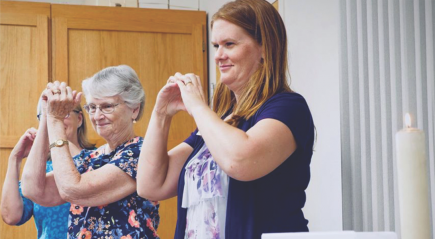When Katrina Foster first stepped inside St. John Lutheran Church in New York City, she felt a sense of awe. This towering, neo-Gothic building in Brooklyn, a marvel of the Gilded Age, dates back to 1891, with ornate stained-glass windows, a vintage Jardine & Son pipe organ and a soaring vaulted ceiling.
But that ceiling was crumbling by the time Foster arrived as pastor of St. John in 2015. Flakes of lead-based paint fluttered down onto parishioners like snow. The back parapet wall had separated from the building, and water leakage into the bathrooms had created a fertile breeding ground for mold.
“There were times that a piece of the ceiling would fall down next to someone,” she said. “And it really became an evangelism issue, because [first-time attendee] parents would walk in, appraise the situation and say, ‘I’m not letting my kid be exposed to these lead paint chips.’”
Many in Foster’s situation would likely also have walked out the door. But she was no stranger to the challenges posed by churches and their buildings.
A sense of call
Growing up in Florida, Foster knew she wanted to be a minister at a young age.
“When I was four, I started acolyting with candleholders my dad made, because I was too short to reach the candles,” she said. “And at 14, I went to a discernment retreat for people in the [Florida-Bahamas] Synod who had a sense of call.”
A few years later, when Foster began her studies at Newberry (S.C.) College, she met a woman pastor, something she’d never encountered.
“Rev. Dr. Daphne Burr changed my life,” Foster said. “She assured me that there was a call placed on me and that it was legitimate, regardless of the excuses I had for why it couldn’t be real and true.”
“She assured me that there was a call placed on me and that it was legitimate.”
Foster enrolled at Lutheran Theological Southern Seminary, then located in Columbia, S.C., and was ordained in 1994. Her first call took her to New York City, to Fordham Evangelical Lutheran Church in the Bronx, a racially mixed congregation that had dwindled to fewer than 20 members and whose building was in serious need of repair.
“They were suspicious of me,” Foster said of her first congregants. “They’d never had a woman pastor, and I was southern—these were mostly people of color who really understood racism.”
Foster won them over, she said, and by the time she left the congregation, 16 years later, it had grown to 120 members, banked a million dollars and developed multiple revenue streams that funded Fordham’s ministries and faith-based community organizing.
A “supercharged blessing”
While at Fordham, Foster began to develop a reputation as someone who could turn a struggling church around, and in 2008 she was asked to relocate to Long Island to revive two churches teetering on the edge of closure—the Hamptons Lutheran Parish congregations of Incarnation Lutheran Church in Bridgehampton and St. Michael in Amagansett. Through community-building efforts that included radio ads and her appearances on local TV shows, Foster helped the congregations grow while also securing resources for outreach projects such as a low-income senior housing center.
By the time Foster arrived at St. John, she’d figured out the formula for transforming troubled churches: a mixture of community-building and financial stewardship. The latter can be difficult for pastors, she believes.
“Almost every pastor I know would rather talk about sex than money—and they don’t want to talk about sex,” she said. “It’s not something pastors are comfortable talking about.”
“It’s not something pastors are comfortable talking about.”
After struggling with her personal finances, she began to manage them successfully after reading books on the topic and connecting with Rip Hoffman, an ELCA pastor and stewardship-education consultant to churches. Hoffman mentored Foster in stewardship and encouraged her to pursue a degree in the practice. When she earned a Doctor of Ministry degree from the Lutheran Theological Seminary at Philadelphia, she focused on stewardship and Martin Luther’s theology of the cross.
Today, applying principles she learned through her ministry, Foster guides her congregation on achieving financial success while also building up its community. She focuses on creating multiple revenue streams for St. John, from offerings to investments, and doesn’t shy away from asking the community to support the church’s efforts. The congregation uses those funds to make repairs and support ministry efforts.
“We get to choose,” she said, “and if we don’t give it away, this money’s just going to become a false idol. But if we practice generosity, this is going to become a supercharged blessing.”
Transformative ministry
Acting on Foster’s philosophy, St. John has raised enough money to fund major building renovations and such ministries as providing financial assistance to out-of-work members during the COVID-19 lockdowns. The congregation hosts regular financial literacy classes to help members of the church and the community take charge of their money in the same way that St. John has.
“I’ve been involved in the financial ministry, and it was a really great experience,” said Olivia Ludington, a St. John member. Ludington now owns her own business, thanks to the church’s financial literacy classes, she said. “I was able to learn more about my finances, and now I’m able to give more to others.”
Ludington first came to St. John after passing by the church and seeing its open-door policy. Foster’s ministry felt so welcoming to her, she recalled, that she became a member of the church.
Foster’s ministry felt so welcoming to Olivia Ludington that she became a member of the church.
“It’s been a really incredible experience for me to meet people and see the world through ‘God goggles,’ as Pastor Foster says,” Ludington said. “I’ve grown in my faith so much with her, and I look up to her as a role model and respect what she’s done with the church. I’ve found a good home here.”
Foster says that, going forward, the ELCA must rethink the way churches operate—not only how they reach out to their communities but how they steward their finances. Instead of closing and selling buildings, she believes, congregations can find better uses for their physical assets, such as mixed-use affordable housing that can still host church activities. She believes that such an approach will strengthen the ELCA and its mission for years to come.
“We have to reimagine how we do ministry rather than closing and selling our properties,” she said. “We really need to reimagine how we organize people, resources and power to do transformative ministry in every place.”











